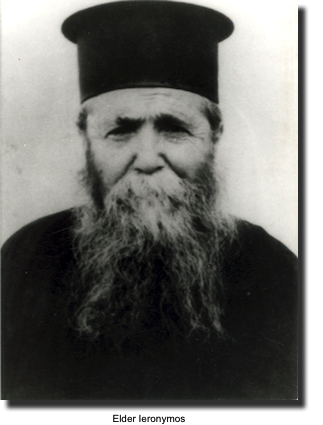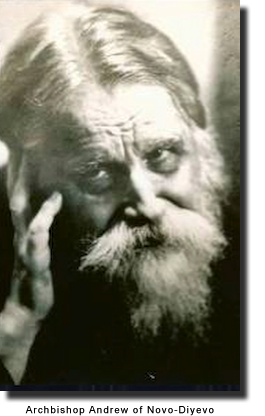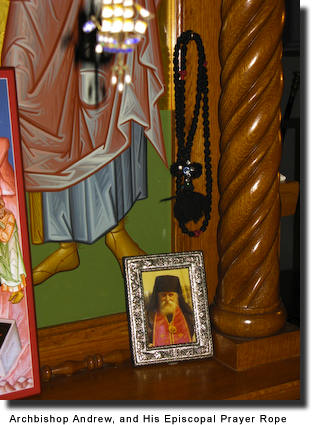Home>North America>Life of AB Gregory
Chapter 21: The Meaning of Fr. Ieronymos’ Words

Father Gregory had time now to reflect on what was told to him by Fr. Ieronymos. He opened his Greek lexicon to look up the word afes. This word was used when the soldiers who had crucified Christ brought to Him vinegar on a reed and the Jews said, “Afes. Let us see if Elias will come to save Him.” It was translated as, “Let be.... Let us see if Elias will come to save Him.” But this was ancient Greek. Father Gregory determined then that he was going to ask Mother Stephania on their next meeting about this word. He described it to her in the same context as it was told to him, that is, if a disciple and his elder meet a man gifted with divine foreknowledge, who says to the disciple, “Who is your elder?” Then, “Do you know him or do you have him?” And then he says to him, Afesseto. “What does that mean?” Without the slightest hesitation, Mother Stephania answered, “The saint is telling the disciple to leave his elder.”
At this point, Fr. Gregory‘s blood almost curdled, for this explained all of Fr. Panteleimon‘s actions for the last decade, and why he refused to translate this part of the conversation. In another aspect though, Fr. Gregory looked upon this as a great comfort and consolation, that now, at that moment not only Archbishop Andrew was encouraging Fr. Gregory to leave, but even from the dead, the newly revealed word of Fr. Ieronymos had come to him, confirming the same sentiment. Father Gregory was amazed, and yet he wanted to confirm it again, to make sure that Mother Stephania‘s translation was accurate, so he asked another Greek man, Eftychios, and he said the same thing.
There were many occasions when the abbot would ask Archbishop Andrew to retract his blessing. The archbishop would not hear of it. Then, on another occasion, one of the priests of the Russian Church Abroad traveled from Boston to New York. He took with him some parishioners, along with Fr. Panteleimon. This priest was the translator for the abbot and everything that transpired was related to Fr. Gregory later. When the abbot came back from this visit, he was noticeably disturbed and could not even look at Fr. Gregory face to face. Of course, Fr. Gregory could not have imagined what happened, but he understood it was not favorable towards the abbot. It was months later when he finally heard the story from the priest himself, Fr. John Lewis.
Father John related that from the time they left Boston on that trip, since there were other people in the car and the topic was Archbishop Andrew, the abbot spoke continuously of the man‘s virtue, of his gift of divine foreknowledge, of his miracles, and how that if there was ever any problem in the monastery, Archbishop Andrew was the answer. He spoke of how grateful he was to have him as his spiritual father. Of course, all those in the car were immensely edified. When they arrived at the archbishop‘s residence, everyone greeted Vladyka and received words of blessings and encouragement. Then, as was the custom, the abbot asked all to leave while he had “confession,” with Fr. John as the translator. Throughout this time, the archbishop gazed intently on Fr. Panteleimon without interruption. His eyes were fastened on him.

Immediately the abbot related to Vladyka Andrew that Fr. Gregory was needed in the monastery. He was the only iconographer and did many other needful things in the monastery and that the monastery could not afford to have him leave, and besides this, he is a great schemamonk. He pleaded with the archbishop to change his mind, and tell Fr. Gregory to stay in the monastery.
The archbishop answered, “No, no, many monks have left their monasteries to better themselves.”
At this point, Fr. John related how the abbot started to get irritated at the bishop, primarily, he thought, because the idea of someone bettering themselves outside this abbot‘s monastery was unacceptable.
The abbot again said to Vladyka Andrew, “How can he leave? He made vows of stability and obedience!”
At this the bishop rejoined, “Many saints have left their monasteries doing the will of God. For example, St. Zosimas in Syria left his monastery to go to Palestine, and he was accounted worthy to meet and give communion to St. Mary of Egypt, and to give us her life. Shall I give you more examples?”
At this, Fr. John relates, the abbot was beginning to unravel. The abbot said, “I will not let him go!”
The archbishop answered, “When Fr. Gregory leaves the monastery, it will be very bad for you. In fact, it will be a disaster.”
He answered the bishop very sternly, and said, “This is against the canons, and there are only two reasons a monk can leave his abbot: if he is a heretic or if he is immoral. Therefore, Fr. Gregory has no right to leave me.”
At this statement, the archbishop continued to look steadfastly at the abbot, and said, “You may not be a heretic, but watch out for the other!”
It was at this point that Fr. Panteleimon did loose his composure, and he immediately got up from his seat and left the room without receiving Vladyka Andrew‘s blessing. Father John was scandalized that the abbot would insult the bishop in such a way, but now he had to drive back all the way to Boston after this unpleasantness and was trying to keep himself from criticizing or being irritated at Fr. Panteleimon.
Father John related how the return trip was just the opposite of the first part of the journey, not only in direction, but also the mood inside the automobile. The abbot was now criticizing Vladyka Andrew, saying how he must be a little bit in prelest, because he had a Roman Catholic statue in the back of his house, how certain people went down to him and were not helped in the least, but rather became worse, and other similar things. Of course, all of this was pure slander, because the statue was part of the purchase agreement of the property when Novo-Diveyevo was bought. It was stipulated by the former Roman Catholic owners that a statue must remain on the property. It was only about one foot high, and so it was put behind the house where no one could readily see it. As far as people not seeming to be improved in their spiritual life, it was without exception due to their disobedience to the archbishop‘s directives.
It was about this time that Archbishop Andrew sent a gift to Fr. Gregory secretly. It was his bejeweled episcopal prayer rope, which had sixteen stones sewn into the cross. This prayer rope is displayed prominently in the Cathedral of the Dormition at Dormition Skete, above Archbishop Andrew‘s picture, by the icon of Saints Peter and Paul.

The next incident that happened was when the abbot and his second in command, Fr. Isaac, came to Fr. Gregory and said gleefully, “Archbishop Andrew sent you a letter, saying you are not to leave the monastery.” Father Gregory said, “OK, show me the letter.” They replied, “No, we‘re not going to show you, but we have it.” To put it mildly, this type of behavior very much perplexed Fr. Gregory. The next day, he again asked to see the letter and they refused again. Soon thereafter Fr. Gregory came to the abbot and said to him, “Let us settle this once and for all. You say you have a letter that says I should stay in the monastery, and you don‘t want to show it to me. I believe that Vladyka Andrew has given his blessing, and I believe that this is a good work from God. Let us both go and meet him face to face, for this is the only way we are going to solve this problem.” The abbot reluctantly agreed, for what else could he do without seeming totally unreasonable?
|
Archbishop Gregory Dormition Skete P.O. Box 3177 Buena Vista, CO 81211-3177 USA |

|
|
|
Copyright 2011 - Archbishop Gregory Last Updated: July 12, 2011 |
